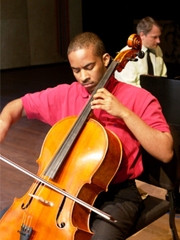|
Back
Notes From Ms. Saariaho’s Cosmos New York
Alice Tully Hall, Lincoln Center
12/12/2016 -
Kaija Saariaho: Lichtbogen – Solar – Notes on Light
Khari Joyner (Cello)
AXIOM, Jeffrey Milarsky (Conductor/Director)

J.Milarsky/K. Saariaho (© Peter Konerk Photography/Priska Ketterer)
In terms................. of their worlds, Kaija Saariaho is the contrary descendant of Olivier Messiaen.
The French composer embraced his God, his nature, his universe–the subjective spirit of his times. The Finnish composer may not reject God, but her sphere encompasses the quantum science of her times. We have no god, but we have the gravitational pull of the planets, the time-space relativity of the cosmos, parallel universes existing in the provable non-reality of physicist blackboards. And we have the heart of her own music.
The program of three relatively early works by Ms. Saariaho was played by AXIOM, that wonderful musical ensemble led by Jeffrey Milarsky. The musicians of AXIOM have mastered the most complex sounds with such easiness that Mr. Milarsky needs no baton, no special signs to make them produce. In the music of Ms. Saariaho, her quarter-tone underpinnings, her atmospheres, and, here, even her electronic sounds erupt like solar flares.
Which, not coincidentally, was a subject from one of her pieces here.
The concert was more than respectful. One stands in awe of Ms. Saariaho and Mr. Milarsky. At the same time, though, it is unfair to devote an entire evening to the composer. Her music is evocative, yes. But the complexities are as much on an unconscious as conscious level. And even in these three works, one’s concentration must be both unyielding and–admittedly–not totally on an even keel with the music.
In fact, one can easily omit her most important purposes, which involve quantum visions, 17th Century philosophy, colors and lights, spectra, tensions, gravity and planetary orbits. Instead, one can relax into the pure comfort of her sounds.
Yes, her chamber orchestral effects in Lichtbogen (“Arc of Light”), inspired by a trip in northern Finland to see the Northern Lights, were splendid, but this was not her goal. This listener was mesmerized by the flute/alto flute/piccolo work by Emily Duncan, which led the piece. And was entranced by the colors of piano/harp/vibraphone and instruments in the highest registers.
But of course she meant much more than that. Who knew that, listening to this bright and subtle canvas, she had taken her lead from a computer reading from the first note of the solo cello? Or that the phonemes from Ms. Duncan were from a French translation of the Welsh metaphysical poet Henry Vaughan?
Well, having read the extensive program notes by Matthew Mendez, I was aware of these inner meanings. At the same time, I could be cerebrally lazy and allow my brain to sink into the colors themselves, enjoying her intricate compositional skills.
It was almost the same in the following Solar, based on the an amalgam of (wait for it) the equations of solar flares, the “magnetic, gravitational dynamic to the glaring solar flares...” As well as “the imperceptibly rotating and revolving from a multiplicity of angles...”
I’ve read enough science to know what Ms. Saariaho was aiming for. Yet her musical metaphor, grandiose as it was last night, could have been more directly be displayed by taking the crosstown bus to the Planetarium and see the whole thing in cosmological context.
So instead, Solar made its points with volume. The volume of an unearthly fffff opening chord, continuing in a whirlwind of sounds led by Anthony Limoncelli’s high trumpet notes which would have made Dizzy Gillespie jealous.
Ms. Saariaho’s work was flamboyant, explosive, filled with colors from both piano and piano-sampler, and with (I use the program-note phrase) a “timbral corona, like infrared light emitted by the sun that we can feel but never see.”
And certainly hear.

K. Joyner (© Courtesy of the Artist)
The final work could have brought us back to earth. A cello concerto. Granted a concerto with more of a cosmologist’s title: Notes on Light. The title itself subject to many an interpretation. Was she “explaining” light? Was she taking the rays of light and placing her own notes upon its velocity? Had Ms. Saariaho experienced a light event, and written a musical discourse?
I frankly didn’t care. What I did care about was Khari Joyner’s marvelous playing. It was of course cadenza-like. But in notes, which gave scurrying explanations by the orchestra, he produced a brilliant yet subtle picture from Ms. Saariaho’s musical purpose.
While this was relatively late, written in 2006, Ms. Saariaho was inspired to give true impetus to the solo instrument. It could give virtuosic scurrying in On Fire, or remain basically quiet for Eclipse. But in the finale, Heart of Light, Mr. Joyner became almost a Romantic in his lyricism, in the fragility of the phrasing, in the almost nostalgic look at the music before.
Later I read that Ms. Saarihao had prefaced this movement with five lines by T.S. Eliot. And while I might have been illuminated by this knowledge, Mr. Joyner’s cello did speak for itself.
Again, I feel it an imposition to listen for an entire evening devoted to Ms. Saariaho. Her music is too rarefied, her destinations too equivocal, too much dependent on extra-musical images. Her visions are not peripheral, they have no Apocryphal Scriabin-like purpose. Instead, they singular and direct and no doubt projected with the genius of her inspiration. But for the listener, her cosmic voyages, one following another, are too overwhelming to follow.
No, I’m not saying we should have had an entr’acte from Shwanda The Bagpiper. But in listening to a few consecutive hours of Kaija Saariaho, one should be prepared for a journey which can be startling, soporific and at times too cryptic for our mere mortal values.
Harry Rolnick
|